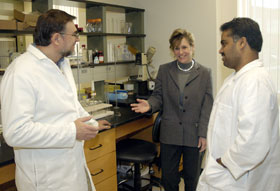Incubator Helps Turn Scholarly Research Into Viable Business Ventures
 |
|
Alexander Zvonok, left, and C.R. Ramanthan, of Mak Scientific, talk with Rita Zangari, executive program director of the Technology Incubation Program. The program helps nurture start-up companies. |
| Photo by Dollie Harvey |
Rita Zangari watches success take shape right outside her office door.
As executive program director for UConn’s Technology Incubation Program (TIP), she helps faculty turn scholastic research into viable products and businesses. TIP is a key component in the University’s effort to help create a high-tech economy that will bring investment and high-paying jobs to Connecticut.
“We are growing businesses for the future,” Zangari says.
Aimed at nurturing the successful startup of high-tech companies, TIP offers fledgling faculty entrepreneurs lab and office space ready access to UConn researchers, facilities, and equipment, and to a variety of business and University services to help them succeed.
“The idea is to allow them to become established, and then to move on as they grow,” notes Zangari, who joined TIP last July. She was previously deputy commissioner of the Connecticut Department of Economic and Community Development, and before that she spent 27 years in a variety of business-related senior positions in state government.
Zangari is increasing the University’s efforts to bring new ideas to the marketplace. She anticipates that her next client may be a technology-based company using research done at the Avery Point campus that could make testing for bacteria in the ocean as easy as checking chlorine levels in a pool, and provide a huge benefit to surfers, beachgoers, and lifeguards.
“Knowledge of TIP hasn’t yet penetrated the University community by any means,” she says. “It takes time for faculty entrepreneurs to realize there are opportunities out there and TIP is the place they can bring their ideas – that with support they can launch these business ventures.”
TIP fits within the larger Office of Technology Commercialization at UConn. Together with the Center for Science and Technology Commercialization (CSTC) and the UConn R&D Corporation, the programs provide a variety of resources to support entrepreneurs as they begin patenting and licensing and move to funding and commercialization.
TIP oversees three facilities where start-up companies can get rolling for less than it would cost them to rent individual office space, including Farmington, Avery Point, and the Advanced Technology Lab in the new BioSciences Complex at Storrs, where Zangari’s office is located. Started three years ago, TIP is nearly at full capacity, currently hosting four start-up companies in Storrs and two in Farmington that together employ about 30 scientists.
The six firms pay TIP incubation fees with rights to remain in the incubator for up to three years and to gain access to a variety of business services as their needs change. In some cases UConn, through CSTC, retains title to the inventions created in University labs and shares in the proceeds generated by their commercialization, Zangari explains.
TIP gives preference to companies commercializing technologies developed at UConn, but that is not a requirement of the program. “To be admitted to TIP, a company should be technology-based and have some synergistic relationship to UConn,” Zangari says. “A business might have a current or a historical technology link to the University – for example, if it has been formed around a University-developed technology. Or perhaps the business is collaborating with University faculty to develop a new product or technology.”
Applicants must be willing to share information with the TIP committee and commit to developing a full business plan within two years of occupancy, Zangari adds. They are also expected to give priority to Connecticut locations when they leave the incubation space.
“Considering that half of all small businesses fail within four years, the value of locating and operating an incubator is immense,” Zangari says. “Studies show that 87 percent of incubator companies are still in business today and 84 percent of that number stay in the community.”
Current TIP tenants include:
- MAK Scientific, investigating
medications based on cannabinoid technology developed by Alexandros
Makriyannis, a former UConn
professor;
- Inframat, a nanotechnology
company developing biosensors;
- Evergen Biotechnology, founded by Professor Xiangzhong “Jerry” Yang
to improve dairy productivity and commercialize transgenic technology;
- I’mPACT Word, a Japanese spin-off working with Professor Steven Suib
to develop plasma-assisted catalytic technology;
- Sensor Research, developing biological agent and pathogen detection systems;
- and Hepaticus, developing a patented technology for diagnosing and treating liver disease.
MakScientific was founded on research conducted by Makriyannis, who recently left UConn after 30 years to lead Northeastern University’s drug-discovery program. Using the UConn-licensed technology, his company launched commercial initiatives for treatment of pain, obesity and glaucoma. Makriyannis estimates the market potential for the company exceeds $9 billion annually for pain medication and $1.2 billion for obesity treatments.
“I have four chemists with advanced degrees working for me,” says Makriyannis, to explain why he opted to commute to Storrs twice a week and maintain his company’s relationship with TIP after leaving the University. “It is very attractive to be part of a university community when developing medications. Having proximity to the equipment and other services we use makes it easier to develop marketable products.”
Ian Hart, UConn’s director of industrial initiatives and TIP founder, says “I think we have come a very long way in a short amount of time,” citing the establishment of TIP’s facilities, a core staff, and advisory committee.
“Business incubators have a public purpose,” Hart explains. “The University has huge resources, equipment, and knowledge. This is another way for the state to see a return on its investment in the University, and a contribution UConn can make to the future economic development of the state.”

